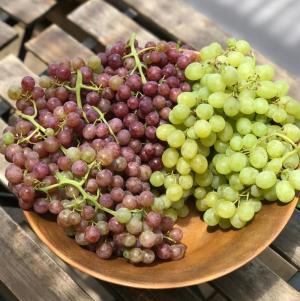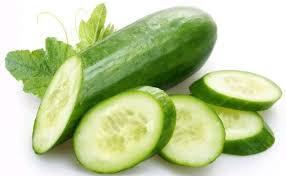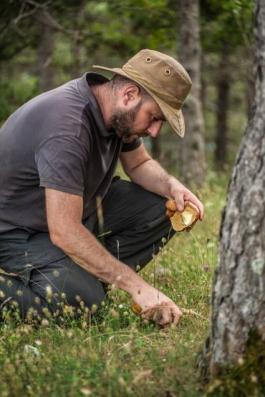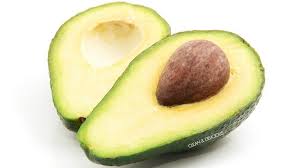Although I typically complain about the summer weather (I sympathize with my dear friends, the plants, who have roots, who cannot enjoy a moment of conditioned air and have to stand outside under the scorching sun all day), this week I thought it was actually very nice to live in a warm country. Not only the fact that I never really had to argue with my kids regarding which coat to wear or not to wear to school, because there aren't any real snowstorms here and most likely they won't freeze even in a sweatshirt, there's plenty of fruit here, and the weather (except during July August of course) is usually very pleasant.
An abundance grows around us that we are so used to, that many times we take it for granted. There are plenty of fruit trees in gardens, laden with fruit that no one collects. So much so that we sometimes look for neighbors to hand over the fruit products of our tree, and do not always find new owners for all the fresh produce. Try telling this to someone who lives in a cold European country, or in a country where fruits and vegetables are sold by the unit, the price being appropriately high, like Japan for example.
A friend of mine who immigrated from Russia at an early age told me there is no such thing there: if there is a fruit tree in a yard, it is protected, nurtured and patrolled around to see when the fruits ripen, and anyone daring to pick an unripe fruit will be in trouble. Here there are fences around houses with passion-fruits growing larger and more beautiful than those in the store, or with vine clusters that are hung, crispy and juicy, inviting passers-by to pick a grape, wipe on their shirt, and taste. I thought about all this as I passed by my neighbors' fence this week, doing exactly that – a tasting workshop of their wonderful Muscat grapes.
Grape vines, and the wine culture associated with them, are very ancient. The two nations who took the issue particularly seriously were the Iranians and the Georgians. Today's Iran drinks less wine, but the Georgians are still a symbol of people who are happy with their wines. The Georgians’ affinity to wine goes back to the time when they embraced Christianity – when the saint who brought the gospel, Nino, arrived with a cross made of vine branches.
Wine was an integral part of traditional rituals of sadness, joy, celebrations and education. In the 10th century and after it, the curriculum at Galati Academy, the great educational center of the time, wine preparation and preservation studies were mandatory. Handling grapes and wine were not unique to the peoples of those regions, of course. The Phoenicians and Ancient Egyptians had already invested efforts in cultivating various varieties of grapes, as did the Greeks and Romans.
In Israel, grapes have been one of the basic crops since Biblical times, through the Middle Ages and till the New Age. While to the best of my knowledge, none of the prophets walked around with a staff made of vine branches, but the tribe of Judah was known to be rich with vines, and vine-related words (such as wine, vineyard, raisins, etc.) are mentioned in the Bible some 300 times, as well as in the list of species our land is blessed.
Despite the variety of species that existed here during the Biblical period, most of them disappeared with the Ottoman occupation and the ban on wine drinking. In order for us to enjoy the original species that grew here in the country hundreds of years ago, vineyards from remote places in the country had to be found, genetically scanned to verify which ones are native and which are imported, and the native ones were distributed and nurtured.
Wine does indeed delight human hearts, but does much good for the body as well. One example of the good effect of the wine is the "French Paradox" – the French diet includes many high-fat foods, such as ripened cheeses and sausages, but the typical French people are slim and shapely – how could that be? One of the answers to this puzzle is that the "bad" cholesterol (LDL) cannot sink in the presence of resveratrol, a powerful antioxidant found in large dosages in wine, which also contains fine amounts of vitamin B, C and magnesium. The grapes do best in the summer when kept in the freezer – in case we want to make a grape ice drink…
To health!
Yours,
Maggie's Garden team
Forecast:
In the ORGANIC vegetable baskets we expect (draft only):
Tomato
Cucumber
Lettuce
Onion
Eggplant
Parsley
Potato
Spinach
Pumpkin
The LARGE organic vegetable baskets also include:
Cilantro
Sweet potato
Cabbage
In the ORGANIC fruit baskets:
Grape
Banana
Watermelon
The LARGE organic fruit baskets also include:
Papaya
Melon
New! New! The ORGANIC Green Basket:
Kale
Swiss chard
Mint
Basil
Dill
Sprouts
Celery root
A kind of lettuce













